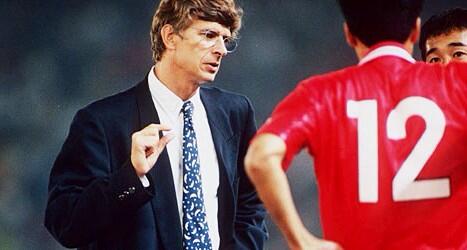After seven largely successful years in charge of France’s AS Monaco, Arsene Wenger had certified his reputation as one of the most promising young managers in football.
He’d led Monaco to the Ligue 1 title in 1988 and a Coupe de France triumph in 1991. They’d also reached the semi-finals of the Champions League in 1994, leading to interest from Bayern Munich and Werder Bremen in the managerial services of Wenger.
He'd built his reputation as an astute, multilingual and forward-thinking coach who was capable of building and nurturing young squads.
However, after being dismissed following a poor start to the 1994/95 season, Wenger shocked everyone by joining Japanese J.League side Nagoya Grampus Eight in January of 1995.

Photo: @TheJordanDenton | Twitter
A 45-year-old coach who’d led his team to the semi-final of the European Cup was forsaking interest from top European clubs to move to a league that was barely two years old.
The Japanese J.League kicked off in 1993 with only 10 clubs. The vision behind the league’s formation was, in part, to help Japan land their bid for the 2002 World Cup.
While sumo wrestling, baseball and golf had traditionally dominated the Japanese sporting landscape, investment from major Japanese companies had enticed the likes of Gary Lineker, Dragan Stojkovic and Zico to Japan.
For Wenger, the opportunity to challenge himself and learn in a completely foreign environment, if only for a year or two, was too great an experience to pass up.
Wenger stayed at Nagoya Grampus for 18 months between 1995 and 1996, and his influence there still resonates. The club went from the bottom of the table to being Emperor’s Cup champions in his first season. He received the J.League Manager of the Year award and led them to their best-ever league finish, second — a mark which would stand until 2010.
As British academic Dr Christopher Hood says in the novel The Professor: Arséne Wenger, “If there’s ever been a case proving how important a manager is, then Arsene Wenger’s time at Nagoya Grampus is it, because he went in there and he didn’t really change the playing squad a great deal but turned their fortunes round overnight almost.”
According to some, Wenger’s time in Japan gave him back his faith in soccer. After Marseille’s match fixing scandals had attributed to his desire to quit French football back in 1994, Wenger was rejuvenated in Japan.
“It was a welcome change in my life, a fantastic experience,” says Wenger. “It’s something that changed me profoundly as well. The vision I have of life changed in Japan.”
Unworried by relegation, which didn’t exist at that time in Japan, Wenger was able to concentrate on the freedom of “avoiding humiliation”, something Nagoya had struggled with previously.
“I realized that football was what I enjoyed; the rest was just people’s opinions. So since I came back with Arsenal I take the same approach. I concentrate on the football, on training the team. I can be happy doing that.”

Photo: @KiddyYusuf | Twitter
Learning to let go while also devoting himself entirely to his work as a coach, the 18 months were mutually beneficial for both Japanese football and Wenger: Wenger left an indelible mark on Japanese football while the country profoundly affected him.



